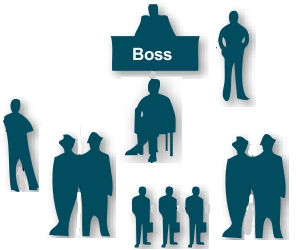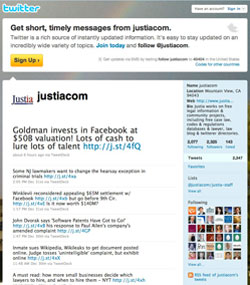
It’s that time again, dear Justia readers, when we give you a Top Ten rundown of last month’s most popular Onward blog and Facebook posts.
Articles Posted in Law Practice
Attention spans are getting shorter. You can only tweet 140 characters. Courts have pleading length restrictions. Judges’ case dockets are packed.
So, how can you get your case to seize the attention of the judge?
If you can use an image that makes a powerful, effective statement about your client’s stance in the case — e.g., putting a picture of your copyrighted work next to the allegedly infringing work — you could grab the judge’s (or her law clerk’s) attention.
 We’re guessing that Sony has its PS3 controllers in a twist today. Sony has been on a legal warpath against PS3 hackers, who figured out and shared the game maker’s jailbreak code. But all that changed yesterday.
We’re guessing that Sony has its PS3 controllers in a twist today. Sony has been on a legal warpath against PS3 hackers, who figured out and shared the game maker’s jailbreak code. But all that changed yesterday.
That’s when Long Island geek Travis La Marr tweeted Sony’s PS3 jail break code to @TheKevinButler, a twitter account run by Deutsch, the ad agency that Sony hired to run its PS3 campaigns. Kevin Butler is the name of a geeky character who appears in PS3 commercials. It seems that the person managing Butler’s tweets at the ad agency RT’d La Marr’s tweet, include the PS3 jailbreak code, to the world.
Getting Organized Over Organized Crime
 Like death and taxes, organized crime appears to be an unavoidable part of life around the world. Today’s FBI arrest of at least 100 alleged members of La Cosa Nostra on the East Coast is just the latest chapter in a real-life saga.
Like death and taxes, organized crime appears to be an unavoidable part of life around the world. Today’s FBI arrest of at least 100 alleged members of La Cosa Nostra on the East Coast is just the latest chapter in a real-life saga.
Would you rather be an educated organized crime buff, or do you prefer to be stuck in stereotypes from the movies (The Godfather), TV (The Sopranos), and fiction books? After all, criminal syndicates have been part of American life for centuries.
Don’t think that organized crime only involves New York’s ‘Five Families’ — the Bonnano, Columbo, Gambino, Genovese, and Luchese criminal syndicates accused today.

Happy New Year to all our Justia friends!
As Courtney wrote in her year-end review, one of the big trends of 2010 was the emergence of social media and its integration into the work of legal professionals. While I’m sure many of our readers may already have a blog, a Facebook page, LinkedIn Profile or Twitter account (to name but a few of these types of tools and platforms), many folks may still feel a bit unsure how this all works. For that latter group, we’re going to post articles on Onward throughout the year that provide basic social media “how-tos” and resource links to help you get started. This post is going to focus on Twitter and also briefly cover Justia’s Twitter community Legal Birds – a place we hope that those of you who are already in the social media mix might join up and participate in.
 Divorce can be messy with the roller-coaster ride of emotions, the legal fight over finances, child support, and dog custody, as well as the divvying up of mementos from the marriage that did not last.
Divorce can be messy with the roller-coaster ride of emotions, the legal fight over finances, child support, and dog custody, as well as the divvying up of mementos from the marriage that did not last.
For married couples who own a small business, a divorce can be particularly challenging. Even though millions of dollars may be at stake, one spouse may be in the dark about the finances of the family business. While lengthy divorces can be expensive, does that mean that you should not fight to get what you are entitled to?
Stacey Napp, the founder of Balance Point Divorce Funding, doesn’t think so. Her company just might lend you money to fight your soon-to-be-ex in court.
Black Friday and Cyber Monday have come and gone, but there’s still time to get terrific gifts for lawyers and clients. Here are some of our favs:
- The Apple iPad — It’s sleek, small, and über cool. It holds nifty free legal apps like Fastcase to find state and federal statutes and cases and Oyez’s PocketJustice that let’s lawyers listen to Supreme Court oral arguments. When your attorney friend is done raging at opposing counsel’s latest outrageous offer to their client, the attorney can vent his or her anger by playing Angry Birds or Star Wars Falcon Gunner. Plus, it makes them (and everyone they meet) think that they’re a swell lawyer, right?
- Adopt a Volume of the Federal Reporter — No, we’re not crazy (at least not all the time)! For $1,200, you can actually make a tax-deductible donation to Public.Resource.Org to support scanning a volume or two of the first series of the Federal Reporter of the United States in the name of your favorite lawyer or law firm. The donation is to help them “adopt” a volume of federal case law from 1880 – 1924 that is now in the public domain.


- Free Law – Justia truly believes that the law belongs to the people. It was created for us, by us. That is why we are thankful for Law.Gov, the brainchild of passionate Government open source advocate Carl Malamud of Public.Resource.Org.
- Google – We are thankful for Google and its continued support of free law by awarding the non-profit Public.Resource.org a $2 million grant to jump-start the Law.Gov initiative. The grant was one of five awarded to Google Project 10^100 winners, a contest to help as many people in the world as possible.
- Facebook – We are thankful for Facebook because we really like making friends. 🙂
- Twitter – We are thankful for Twitter. We love tweeting about the law like little birdies 🙂


The New York Times ran a fascinating story this week about third-party financiers of lawsuits. The Times, together with the Center for Public Integrity, reported that third-party financing of contingency lawsuits is on rise. Specialized lending firms that cater to law firms have emerged, charging premium interest rates (from 15-24%). The funds are used to pay for increasingly complex and costly plaintiffs’ litigation. The Times reports that total investment in this arena now exceeds $1 billion.
Yeah–you read that right. $1B. This factoid in the article that really caught my attention–litigation financing is a big business, and how many of us really knew it existed? When I first read the article, I didn’t really know how I felt about this–except that it seemed like an ethical minefield, but appears to be above board in most states. The article is accompanied by commentary from a panel of law professors, who discuss some of these ethical issues.
 OK, I know I totally missed the boat on this post–National Pro Bono Week was two weeks ago. I was too distracted by Halloween to notice, but I have been thinking about writing this post for awhile. Better late than never, so here we go!
OK, I know I totally missed the boat on this post–National Pro Bono Week was two weeks ago. I was too distracted by Halloween to notice, but I have been thinking about writing this post for awhile. Better late than never, so here we go!
Doing pro bono work is good for the community and your bottom line. Law school taught us that we have a professional responsibility to give back and to promote professional goodwill toward lawyers. But, this post is not about the warm fuzzy feeling you get from helping people. Instead, I want to explain how volunteering can help your practice in substantial ways.
